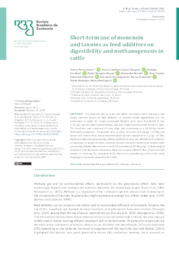Short-term use of monensin and tannins as feed additives on digestibility and methanogenesis in cattle.
Short-term use of monensin and tannins as feed additives on digestibility and methanogenesis in cattle.
Author(s): PERNA JUNIOR, F.; ZAPATA VÁSQUEZ, D. C.; GARDINAL, R.; MEYER, P. M.; BERNDT, A.; FRIGHETTO, R. T. S.; DEMARCHI, J. J. A. de A.; RODRIGUES, P. H. M.
Summary: The objective was to assess the effects short-term use of monensin and Acacia mearnsii tannins as feed additives on nutrient intake, digestibility, and CH4 production in cattle. Six rumen-cannulated Holstein cows were distributed in two 3×3 Latin square experimental design, and each experimental period lasted 21 days. The basal diet was composed of corn silage and concentrate in a 50:50 dry matter (DM) basis proportion. Treatments were control, monensin (18 mg kg?1 of DM), and tannin-rich extract from Acacia mearnsii (total tannins equivalent to 6 g kg?1 of DM). Nutrient intake and apparent digestibility coefficients were not affected by the addition of monensin or tannins to diets. However, tannins showed a tendency to reduce crude protein digestibility. Monensin decreased CH4 emission by 25.6% (g kg?1 of body weight) compared with the control treatment. Monensin is more effective than Acacia mearnsii tannins in reducing CH4 emissions in the short term, considering a diet of the same roughage:concentrate proportion for cattle.
Publication year: 2020
Types of publication: Journal article
Keywords: Animal nutrition, Gas production, Methane, Ruminants
Observation
Some of Embrapa's publications are published as ePub files. To read them, use or download one of the following free software options to your computer or mobile device. Android: Google Play Books; IOS: iBooks; Windows and Linux: Calibre.
Access other publications
Access the Agricultural Research Database (BDPA) to consult Embrapa's full library collection and records.
Visit Embrapa Bookstore to purchase books and other publications sold by Embrapa.

